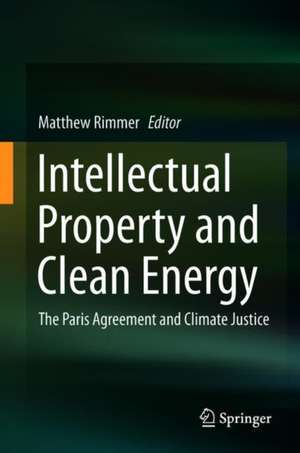Intellectual Property and Clean Energy: The Paris Agreement and Climate Justice
Editat de Matthew Rimmeren Limba Engleză Hardback – 6 noi 2018
| Toate formatele și edițiile | Preț | Express |
|---|---|---|
| Paperback (1) | 2110.51 lei 6-8 săpt. | |
| Springer Nature Singapore – 23 dec 2018 | 2110.51 lei 6-8 săpt. | |
| Hardback (1) | 2115.80 lei 6-8 săpt. | |
| Springer Nature Singapore – 6 noi 2018 | 2115.80 lei 6-8 săpt. |
Preț: 2115.80 lei
Preț vechi: 2580.25 lei
-18% Nou
Puncte Express: 3174
Preț estimativ în valută:
404.90€ • 439.67$ • 340.12£
404.90€ • 439.67$ • 340.12£
Carte tipărită la comandă
Livrare economică 22 aprilie-06 mai
Preluare comenzi: 021 569.72.76
Specificații
ISBN-13: 9789811321542
ISBN-10: 981132154X
Pagini: 1260
Ilustrații: XVI, 686 p. 6 illus.
Dimensiuni: 155 x 235 mm
Greutate: 1.21 kg
Ediția:1st ed. 2018
Editura: Springer Nature Singapore
Colecția Springer
Locul publicării:Singapore, Singapore
ISBN-10: 981132154X
Pagini: 1260
Ilustrații: XVI, 686 p. 6 illus.
Dimensiuni: 155 x 235 mm
Greutate: 1.21 kg
Ediția:1st ed. 2018
Editura: Springer Nature Singapore
Colecția Springer
Locul publicării:Singapore, Singapore
Cuprins
Part I: International Law.-
11. The Power of Visual Appeal: Designs Law and Clean Energy.-
16. Change Change and Open Data: Information Environmentalism.-
1. The Paris Agreement: Intellectual Property, Technology Transfer and Climate Change.-
2. The Paris Agreement, Climate Finance and Transparency: Charting the Path to Equity.-
3. The Paris Agreement: Development, the North-South Divide and Human Rights.-
4. Climate Change and Human Rights: Intellectual Property Challenges and Opportunities.-
Part II: Patent Law.-
5. Intergenerational Justice: a Framework for Addressing Intellectual Property Rights and Climate Change.-
6. Management of Intellectual Property in Australia's Clean Technology Sector: Challenges and Opportunities in an Uncertain Regulatory Environment.-
7. Intellectual Property, Climate Change and Technology Transfer in South Asia.-
8. Intellectual Ventures: Patent Law, Climate Change, and Geoengineering.-
Part III: Trademark Law and Related Rights.-
9. Trademark Goodwill and Green Global Value Networks.-
10. This Ain’t Your Daddy’s Greenwashing: An Assessment of the American Petroleum Institute’s Power Past Impossible Campaign.-
12. Key Change: The Role of the Creative Industries in Climate Change Action.-
Part IV: Privacy and Trade Secrets.-
13. Environmental Sousveillance, Citizen Science and Smart Grids.-
14. Promoting and Protecting Clean Energy Innovation Through The Trade Secrets Regime: Issues and Implications.-
Part V: Open Innovation.-
15. Energy Democracy, Renewables and the Paris Agreement.-
17. Open Government Data in an Age of Growing Hostility Towards Science.-
18. Elon Musk’s Open Innovation: Tesla, Intellectual Property, and Climate Change.-
Part VI: Plant Breeders’ Rights, Food Security, Access to Genetic Resources, and Indigenous Knowledge.-
19. Path-breaking or history-repeating? Analysing the Paris Agreement’s research and development paradigm for climate-smart agriculture.-
20. Genetic resources, intellectual property and climate change.-
21. Benefit Sharing Under the REDD+ Mechanisms: Implications for Women.-
22. Northern Exposure: Climate Change, Indigenous Rights, and Atmospheric Trust Litigation in Alaska.
Notă biografică
Matthew Rimmer is Professor in Intellectual Property and Innovation Law at the Faculty of Law, Queensland University of Technology (QUT), Australia. He is a leader of the QUT Intellectual Property and Innovation Law research program, a member of the QUT Digital Media Research Centre the QUT Australian Centre for Health Law Research, and the QUT International Law and Global Governance Research Program. He has published widely on copyright law and information technology, patent law and biotechnology, access to medicines, plain packaging of tobacco products, intellectual property and climate change, and indigenous intellectual property. His current research interests include: intellectual property, the creative industries, and 3D printing; intellectual property and public health; and intellectual property and trade, looking at the Trans-Pacific Partnership, the Trans-Atlantic Trade and Investment Partnership, and the Trade in Services Agreement.
Textul de pe ultima copertă
This collection considers the future of climate innovation after the Paris Agreement. It analyses the debate over intellectual property and climate change in a range of forums – including the climate talks, the World Trade Organization, and the World Intellectual Property Organization, as well as multilateral institutions dealing with food, health, and biodiversity. The book investigates the critical role patent law plays in providing incentives for renewable energy and access to critical inventions for the greater public good, as well as plant breeders’ rights and their impact upon food security and climate change. Also considered is how access to genetic resources raises questions about biodiversity and climate change. This collection also explores the significant impact of trademark law in terms of green trademarks, eco labels, and greenwashing. The key role played by copyright law in respect of access to environmental information is also considered. The book also looks at deadlocks in the debate over intellectual property and climate change, and provides theoretical, policy, and practical solutions to overcome such impasses.
Caracteristici
Provides a critical analysis of the impact of the Paris Agreement on climate adaptation and mitigation technology
Offers deep insight into the philosophical and theoretical dimensions of climate justice and ethics
Examines public policy options available in relation to intellectual property and clean energy
Investigates practical examples of intellectual property management and open innovation, including Tesla’s business strategy
Offers deep insight into the philosophical and theoretical dimensions of climate justice and ethics
Examines public policy options available in relation to intellectual property and clean energy
Investigates practical examples of intellectual property management and open innovation, including Tesla’s business strategy
